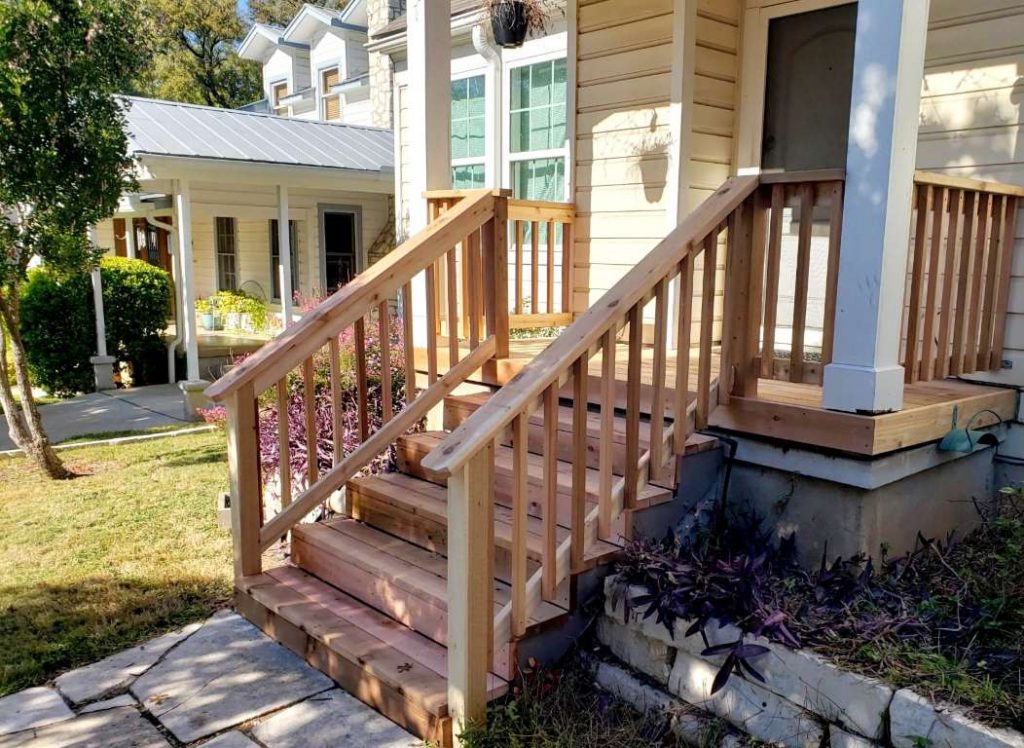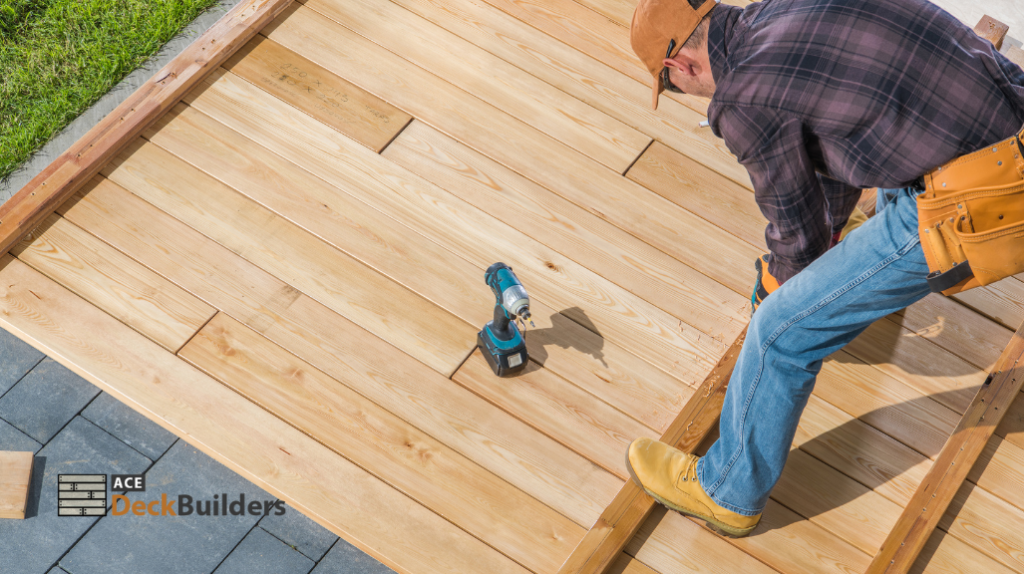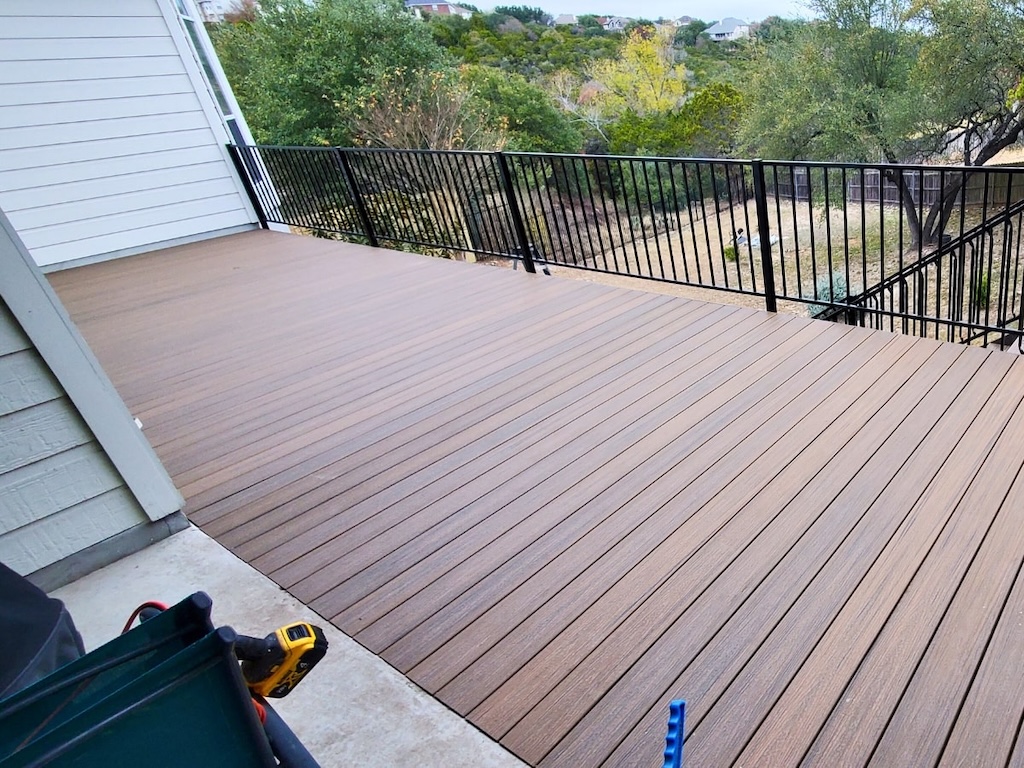TL;DR
If your deck in Austin is showing signs of wear, such as splintering boards, loose railings, or structural sagging, it may be time for a replacement. This guide covers the most common red flags to watch for, explains why they matter in our local climate, and outlines next steps.
Table of Contents
ToggleWhy Deck Longevity in Austin Varies

Decks in Central Texas face heat waves, torrential storms, and big temperature swings. These conditions put extra stress on deck structures, especially if they were built with older or untreated materials. While a well-maintained composite deck can last 25 years or more, a pressure-treated wood deck may require replacement after 15 to 20 years in our region.
Seasonal weather patterns — like freeze-thaw cycles in winter or droughts followed by flash floods — can also cause cracking, shifting, and moisture damage. Add in the intense summer UV exposure and clay-rich soil movement, and it’s clear why Austin decks have a shorter average lifespan than decks in milder climates.
Key Signs It’s Time to Replace Your Deck
Here are the most common signs your Austin deck is past its prime:
Wobbling or Swaying
If your deck moves when you walk on it, the supports may be failing, which is a serious safety hazard.
Rotting or Splintering Wood
Wood rot spreads fast in Austin’s humid spring months. Look for spongy boards, deep cracks, and splinters.
Loose or Missing Fasteners
Screws and nails that won’t stay in place signal structural degradation. This is especially common in decks older than 10 years.
Ledger Board Pulling Away
The ledger board connects your deck to the house. If it’s separating, your deck may be at risk of collapse.
Sinking Footings or Posts
Soil erosion and heavy rain in Central Texas can shift your deck’s foundation, causing it to sink or tilt.
Rusting Metal Connectors
Austin’s humidity can accelerate corrosion. Rusted joist hangers, brackets, and bolts weaken your deck’s frame.
Discoloration and Mold Growth
Black, green, or white mold patches aren’t just unsightly — they eat away at wood and create slippery, unsafe surfaces.
Insect Damage
Termites and carpenter ants are common here. Hollow-sounding wood and small holes are red flags.
Outdated Design or Code Violations
Older decks often lack modern safety features, such as proper railing height and load-bearing capacity.
Austin-Specific Factors That Speed Up Deck Damage
- Intense UV Exposure: Sunlight degrades wood fibers quickly.
- Flash Flooding: Poor drainage causes water pooling and rot.
- High Humidity + Heat: A perfect storm for mold and mildew.
- Clay Soil Movement: The expansion and contraction of soil can cause deck footings to shift.
Austin’s unique mix of climate extremes and geological instability necessitates materials and construction methods tailored to our region.
When Repairs Aren’t Enough
Sometimes, repairs are only a band-aid. Consider complete replacement if:
- More than 20% of your deck boards are compromised
- The frame is rusting, rotting, or shifting
- You’re spending hundreds each year on recurring fixes
- You want to upgrade to composite or multi-level designs
Tip: Investing in a new deck often costs less over 10 years than patching an unsafe or outdated one.
What to Do Next: Inspection, Estimate, and Options

- Book a professional inspection — Our team at Ace Deck Builders offers free consultations.
- Get a deck replacement estimate — Learn what a complete rebuild would cost with today’s materials.
- Explore new designs — Multi-level, poolside, or rooftop? We’ll help you dream bigger.
📍 Serving Austin, Round Rock, Cedar Park, Leander, Lakeway, Georgetown, and Pflugerville.
👉 Get a deck replacement estimate in Austin
👉 Learn about our deck installation process
👉 See why locals choose Ace Deck Builders
FAQs About Deck Replacement in Austin
On average, $30–$60 per square foot, depending on material and complexity. Full breakdown here.
Yes, if the new design includes structural changes. See our permit guide.
Only if it’s up to current code and structurally sound, we inspect it during the estimate process.
Composite and pressure-treated wood are most common. Composite materials last longer and require less maintenance.
Typically 1–3 weeks, depending on size, weather, and materials.
Both have pros and cons. Winter sees less demand, which may result in reduced costs, while summer allows for faster drying times.
Bonus: Materials Comparison for Austin Homes
| Material | Lifespan | Maintenance | Cost per Sq Ft | Pros | Cons |
| Pressure-Treated Wood | 10–15 yrs | High | $25–$35 | Affordable, widely available | Needs frequent sealing |
| Composite | 25–40 yrs | Low | $45–60 | Durable, low maintenance | Higher upfront cost |
| Cedar or Redwood | 15–20 yrs | Medium | $35–45 | Natural look, resists rot | Requires annual treatment |
Case Study: Cedar Park Deck Replacement
Project: Full replacement of a 400 sq ft wooden deck with composite material.
Location: Cedar Park, TX
Issues Found: Rotted joists, termite damage, sinking posts.
Solution: Complete teardown and rebuild with new footings, framing, and composite boards.
Outcome: 15-year manufacturer warranty, upgraded railing, and safer family entertaining space. Home value increased, and maintenance costs dropped significantly.
Tips for Choosing a Deck Replacement Contractor

- Check licensing and insurance — Ensure they’re permitted to work in the Austin area.
- Review past projects — Ask for a portfolio of similar deck work.
- Ask about materials and warranties — Top contractors will guide you through material choices.
- Get everything in writing — A detailed scope and contract avoid misunderstandings.
- Read reviews — Look for consistently high ratings across platforms.
How to Finance Your New Deck in Austin
Building a new deck is a significant investment. Here are some ways to fund your project:
- Home improvement loans — Personal loans tailored for upgrades.
- HELOC or refinance — Tap into equity for larger projects.
- Builder payment plans — Some contractors offer monthly installments.
- Local rebates — Occasionally available through city green-building programs.
Need help deciding whether to replace or repair? Call Ace Deck Builders — your trusted Austin deck experts.
